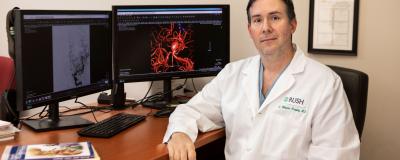Treatment for subdural hematomas (SDH) historically has consisted of non-operative conservative medical management, such as observation, or surgery to evacuate the clot. With surgery, recurrence rates are high, partially due to the highly friable nature of the vascularized membrane that can be associated with these hematomas. In addition, these patients often have extensive co-morbidities, making surgery potentially higher risk than with other patient populations.
Fortunately, at Rush University Medical Center, we are participating in a national, multi-center clinical trial that is evaluating the use of middle meningeal artery (MMA) embolization, a minimally invasive, image-guided approach, for patients with subdural hematomas. The belief is that MMA embolization for patients with subdural hematomas has the potential to decrease the number of patients who require additional, more invasive open surgeries, while also showing promise as a frontline therapy for subdural hematomas that could eliminate the need for open surgery altogether. This type of embolization has been used safely and successfully to treat other cerebrovascular conditions, such as arteriovenous malformations (AVMs), brain tumors and dural arteriovenous fistulas. The application of this procedure to treat SDH was pioneered by Dr. Jared Knopman at the Weill Cornell Brain and Spine Center in New York; he is one of the national primary investigators for the trial.
Accessed by a needle puncture in the wrist or groin, a microcatheter is inserted into a small artery, then threaded up to the side of the SDH. A liquid embolic material called Onyx is injected into the MMA through the microcatheter, reducing the blood supply to the SDH. This blood supply is felt to be one of the main reasons that these hematomas often recur and require additional surgeries over time. By eliminating the blood supply, it is believed that patients can be spared these additional surgeries. Patients often are able to return home the following day.
Hundreds of thousands of Americans require treatment for SDH and, in the past, their only treatment option was open surgery. It is estimated that the annual incidence of SDH is more than 58 per 100,000 in patients 65 and older. This procedure is particularly helpful to these older patients, who tend to experience chronic SDH and are more vulnerable to complications after open surgery. Additionally, mortality rates for SDH for this population are as high as 13%.
Patients who are candidates for this clinical trial may benefit from shorter hospitalization, faster recovery times, and reduced risk of infection. Preliminary results from the procedure are encouraging. Thus far, MMA embolization has shown more than 90% effectiveness in reducing the need for additional surgeries with exceptionally low risk.
About the clinical trial
There are two arms of the study: 1) observation vs. embolization; and 2) surgery vs. surgery and embolization.
Who would be an ideal candidate to participate?
In the observation vs. embolization arm, an ideal patient would be someone with a subdural hematoma and mild symptoms, such as headache or balance disturbances, that would like to avoid brain surgery or whom the referring physician is considering observation.
In the surgery vs. surgery and embolization arm, an ideal patient is someone felt to warrant evacuation of subdural hematoma in a non-emergent fashion.
Who is participating in the study?
Rush University Medical Center is the only site in Illinois, Wisconsin, Indiana and Iowa participating in this study.
For more information about additional sites, as well as more information about the study, go to clinicaltrials.gov/ct2/show/NCT04402632.
Who should I contact to enroll my patient?
Contact Mary Martinez at (312) 563-2783 or Marylou_martinez@rush.edu.

